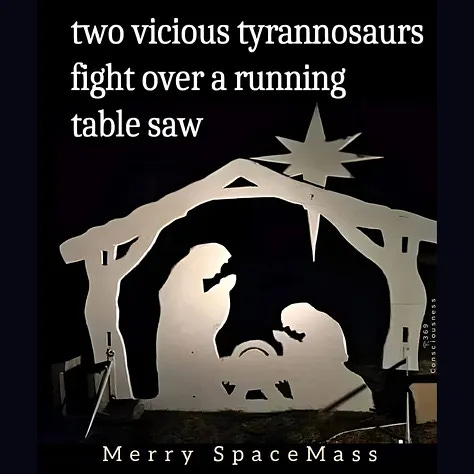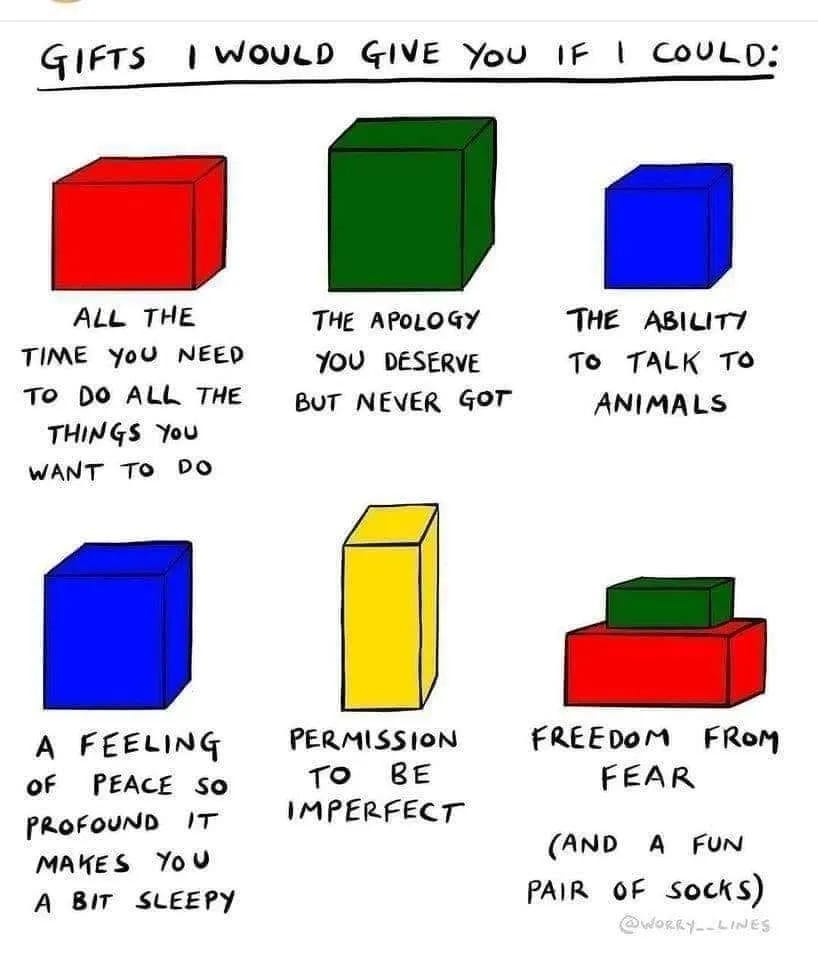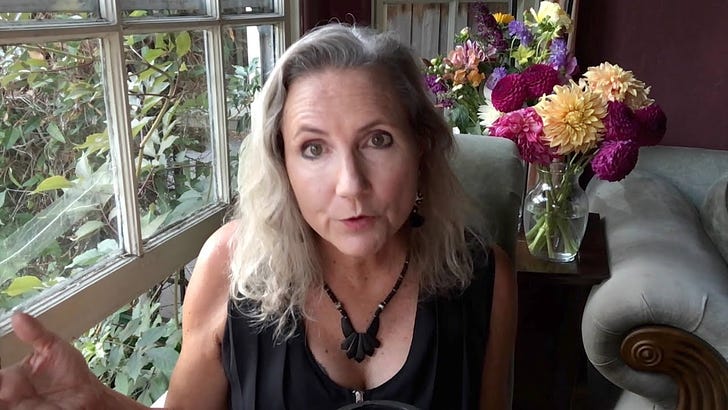In this episode, I’m going to follow the formula I described in How to Have a Better Argument. It will begin the series on The Big Questions from my book draft, A House for the Soul in the Land Beyond Faith. I will challenge you to take seriously a woman in pigtails talking about metaphysics and theology, as I did a couple of Halloweens ago for a woman in cheetah spots (video at end).
But first I’d like to start with some song lyrics.
This is from Bill Callahan’s Free’s, which I discovered from the Spotify or Youtube playlists on Guy Duperrault’s article Goodbye Woke: It Was Fun While It Lasted:
I'm standing in a field A field of questions As far as the eye can see Is this what it means to be free? Or is this what it means to belong to the free? To be free in bad times and good To belong to being derided for things I don't believe And lauded for things I did not do If this is what it means to be free Then I'm free And I belong to the free And the free They belong to me.
Step One: Frame an Open-Ended Question with more than one answer
What is Reality?
Step Two: Like the People You’re Arguing With
Done! If I could fix you a blue martini and give you a foot massage, I would.
Step Three: What does it matter? What would it change?
For something that’s never discussed, it’s hard to imagine any question that matters more. Always, the accuracy of your interpretation of reality is going to determine your success. What would change, depending on the answer, is the appropriate emotions and possible actions in relationship to life and other people.
Step Four: Define what the term[s] mean to you. As opposed to what?
In my piece on The Dogma of Atheism, I had a conversation with Jack Sirius (not to be confused with Everything Voluntary Jack in the episode) on definitions. He wrote:
Maybe this is a result of living in a podcast/YouTube world for too many years, but my own experience is that coming across a definition, especially a definition of a very large and very abstract concept, just stops me dead in my tracks. If I’m reading a textbook or listening to an academic at a conference, then I expect specialized language, including definitions (or neologisms, which I love), but even in that context now I almost always get hung up on the definitions. For whatever reason, they set off my own urge to become hypercritical and I end up staring at the print definition (or into the Void) and thinking of all those semantic/logical/historical weaknesses in the damned definition while formulating a right proper putdown. In conversation, when anyone starts defining terms, I subconsciously shift from conversation mode to debate mode, which, of course, is not a bad thing … so long as the other person realizes that for me rational debate is a matter of life or death.
I responded:
I don't use definitions as something authoritative or agreed upon. I just need to know what you mean when you use a word in order to understand what you're saying about that concept. This is the prerogative and responsibility of the person framing the question. If that word doesn't have the same meaning to the other person, I encourage them to translate it in their mind to the other person's definition or another word that captures the same concept to them. It's the concept that's important, not the word.
As always, my use of upper and lower case are deliberate ways of differentiating between the etymology of a word rather than the social construct it became as a proper noun. That goes for gnostic or anarchist or catholic, originally meaning all-inclusive, or federal as a bottom-up coalition of sovereign entities.
And maybe there's a distinction to be made with lowercase words that addressed Nefahotep's idea that a sovereign individual should never use 'I am' statements followed by a noun. Maybe it could be only proper nouns that are limiting?
So I would define Reality, uppercase, as that which has no opposite, simply What Is. The absence of Reality is illusion but it doesn’t oppose it, it just isn’t there.
Step Five: Expand the realm of possible answers.
Treat each one as a hypothesis. Argue for yours but don’t exclude any that are logically possible. In a comment, Goeff recommended this excellent article on intellectual humility as a lost art:
This is the heart of the argument. Before the pros and cons, evidence and counter-evidence can be weighed, there needs to be agreement on what’s possible. I’ll start with the only portion of the Miriam-Webster definition that doesn’t include a form of the word (what are standards coming to? That’s the first rule of defining!):
something that is neither derivative nor dependent but exists necessarily
I would change ‘necessarily’ to ‘essentially’: what exists in essence, of itself. I would posit the generally accepted understanding of reality as:
that which is confirmed by the sensory perceptions of more than one person
When something happens that could be unreal, the first question is, “Woah, did you see that?” So the starting point of reality is shared perception—what is outside of our solitary mind is objectively real. What’s inside is subjective and open to question as reality. Any experience, from quantum vibrations to alien abduction, is still evaluated by this measure with the mutually perceived world as given evidence of what’s real.
Is this the only possibility? No, there’s one more. If we are not separate minds perceiving independently, then shared perception is not proof of reality. We could be OneMind having a dream that we are separate minds. This doesn’t say what Reality Is, but pulls out the rug from shared perception as ‘reality, duh!’ It opens up the possibility that Reality exists but the world does not.
All phenomenon can logically be explained in the way that everything feels real and make sense within the context of the dream. How would you prove that a dream isn’t a dream? It’s all you, no matter who the voice comes from. Can you die in a dream? No because ‘you’ were never alive in it.
I want to stop here and get agreement that this is a logical possibility. If you have an argument for why it’s not possible, voice it now. There’s no need to believe it’s true or argue why it’s not. The only goal here is to come to agreement that it’s a valid hypothesis, not some New Age wishful thinking spirituality-lite airy-fairy superstition.
As a scientific theory, it fits all the data points. If you can produce evidence showing it can’t possibly be true, speak now, or forever take it seriously. It’s not a matter of life and death, it’s a matter beyond life or death. If true, it would mean that there’s nothing you couldn’t change, simply by changing your mind. It would mean that love isn’t a foolish thing, subject to a life of fear only to end in loss and death.
shaqer rahman rashid wrote about reality in his article on Goethe. Did you know that Goethe identified his religion as Islam in later years? Me neither:
Goethe was an Islamophile [sic], meaning he bore a strong positive regard for what he understood as Islamic religion. By his own stalwart admission, he identified his religion as Islam in his later adult years, although if one reads the New York Times or New Yorker magazine, his religion is apparently a mystery.
Goethe seemed to asked meta-questions, or bigger questions, even while embracing the Enlightenment traditions of simple physical inquiry. Two examples of his genius and generosity in these, is his emphases on a) the morphology of objects as a dimension of analysis, specifically referring to the morphology of living creatures, and b) the factor of “color” (meaning the radiation spectrum according to human perception) as a dimension of the physical universe.
To my point, Goethe adds to the ‘spectrum’ of reality but starts with the physical universe as a given, its tangible and accepted form. shaqer continues:
If both of us agree that ‘red’ and ‘weight of water’ are real, then we are rational to agree these are agreed factors of the physical universe. Just as much as "frequency of electromagnetic radiation” and “resolved gravimetric acceleration” are also real. Meaning color and weight, of course. I mean we have to agree on something, else at best everything is a shared delusion as my friend said—and I don’t think everything is a shared delusion.
Most importantly, shaqer calls me his friend ;-) and second he says “I don’t think,” leaving room for doubt and possibility. The start of an excellent argument!
Here’s what A Course in Miracles says on the question “What is Death?”
Death is the central dream from which all illusions stem. … It is the one fixed, unchangeable belief of the world that all things in it are born only to die. … In this perception of the universe as God created it, it would be impossible to think of Him as loving. For who has decreed that all things pass away, ending in dust and disappointment and despair, can but be feared.
He holds your little life in his hand but by a thread, ready to break it off without regret or care, perhaps today. Or if he waits, yet is the ending certain. Who loves such a god knows not of love, because he has denied that life is real. Death has become life’s symbol. His world is now a battleground, where contradiction reigns and opposites make endless war. Where there is death is peace impossible. …
The ‘reality’ of death is firmly rooted in the belief that God’s Son is a body. And if God created bodies, death would indeed be real. But God would not be loving. … Death is indeed the death of God, if He is Love. …
“And the last to be overcome will be death.” Of course! Without the idea of death, there is no world. … in death are all illusions born. … The inconsistencies, the compromises and the rituals the world fosters in its vain attempts to cling to death and yet to think love real are mindless magic, ineffectual and meaningless. God is, and in Him all created things must be eternal. Do you not see that otherwise He has an opposite, and fear would be as real as love?
So argue with me but don’t dismiss it, which is an underhanded way of winning an argument by deeming the other too unworthy to even play. Play is the operative word here—taking the possibility of love seriously should be fun. And to prove that, I’m going to end with two Christmas memes from finally tobogganing to the end of Tonika’s Visceral Adventures memelanche:
Once you see it, you can never unsee it and …
This is the year of Christmas, little baby Buddha Christs being born all over, rejecting any compromise between love and fear. It’s all love. Let’s dare to question death.
And I’ll end with another song lyric from Jose Gonzales Stay Alive
There's a rhythm in rush these days
Where the lights don't move and the colors don't fade
Leaves you empty with nothing but dreams
In a world gone shallow, in a world gone lean
There is a truth and it's on our side
Dawn is coming, open your eyes
Dawn is coming, open your eyes.
For another bite of the Reality Sandwich, here’s an old one of mine on Daniel Pinchbeck called In the Context of All Being One:
I respond to Russell Brand's interview of Daniel, ‘How Do We Invent a New Future?’ I use the Ten Terrains of Consciousness to describe a future based on unity, and examine superiority as blocking the revelation that "everyone is just us." I look at Chris Ellingworth's application of the Ten Terrains to Luke Skywalker and what it would mean to trust in the force rather than feeling we need to make it all happen. I quote A Course in Miracles to confirm Russell's statement that reality is happening in your head. I give a radical view of the zealots and end with Rebecca Solnit's view of how the revolution will come about.
And this is on the Greek trivium, Rudolf Steiner, A Course in Miracles, the nature of reality and—the most important question—my true relationship to you:
And this is the promised cheetah spot post:
Wearing my Halloween cheetah spots, I respond to Russell Brand's interview of Sebastian Junger on "Our Individuality vs. Our Need for One Another" and go one step further from interdependence to interbeing. I ask whether Christianity and democracy were both designed to serve the empire, and if all hierarchy is patriarchy. To design political, economic and spiritual systems that serve the feminine, I consult a tentacled alien from Octavia Butler's book, Lilith's Brood.







Fun and playful, a sign of it going to the heart of something that might be real on a day when Reality hasn't checked us out of the self-serving line.
Many years ago I did a dream experiment as part of my exploration of Jung and dreams. The question was 'How do I know that I am not at this moment dreaming? That I will wake up to something else and this that I think is 'real' will simply be quickly forgotten, if even remembered, or dismissed as just a silly dream?' The answer: there is absolutely no way to know that!
With time it became an interesting challenge because I'd become adept, with practice, of excellent dream recall and eventually there were times I had a hard time distinguishing between my (so-called) 'awake' diurnal life that is ostensibly real, and the ostensibly dismissible 'real' dream worlds.
What makes this particularly interesting for me at this time, is that in the same way that the Taoists (and Robert Pirsig described in Zen in the Art of Motorcycle Maintenance) there is a difference that is not actually perceptible by the the so-called Reality-focused 5 senses. There is something else.
What is that something else? Love is as good a possibility as anything else!
And going to the Yoga practices as well articulated by Patañjali who echoed Guatama, our first challenge of seeing 'real' the illusion of reality, is to begin to see properly without being deluded by the noise and glitter of that attracts the five senses. What is that which is seeing without senses? Perhaps it is another word for love as well. The one-mind concept you put forward would be another version of that, too.
I love this query. Although I am biased, as you know, given that in many ways much of my writing is an exploration of this question, too.
Do my rambles help? Likely not, although I have no idea of course because communication is perhaps one of the grandest miracles of Life and proof of something beyond our senses. And the pony tails and cheetah spots added play to the words and beyond the delight of the smile they brought to my heart, did not diminish your argument. Although, of course, can I be sure of that? [Headshake.] Life, whatever it is, truly has a wicked, perhaps even devilish, sense of humour!)
I've pondered this reality for quite some time b/c of several things that have happened, once to our 3 yr. old son, once to me, and another time to my brother.
Our son, John, and his dad were driving to the store, where John, in a silly way, told his dad he was going to tell the policeman that his dad made the tree fall. On their way back from the store, a large fir tree had fallen across the road and the fire department was there removing it.
My brother worked at a convenient store, when he was a teenager, and had a dream the store was robbed, and he was shot and killed. The dream upset him so much, he didn't go to work the next day, and the store was robbed at gunpoint, but no one was killed.
I awoke one morning, with a strong feeling that my older teenage daughter was to not get in the car with the guy she was dating due to a possible accident. She thought I was being overly protective, but I was very momma-bear adamant about it. She did not, but he was in not just one, but two accidents that day, one of which was right down the road from us. He was not hurt, but who knows what might have happened to her.
So, my biggest question about all 3 scenarios is how can one know the future if it hasn't already happened - if it isn't in some kind of program? I've had other strange things happen in my life, as well, so I definitely question this reality.